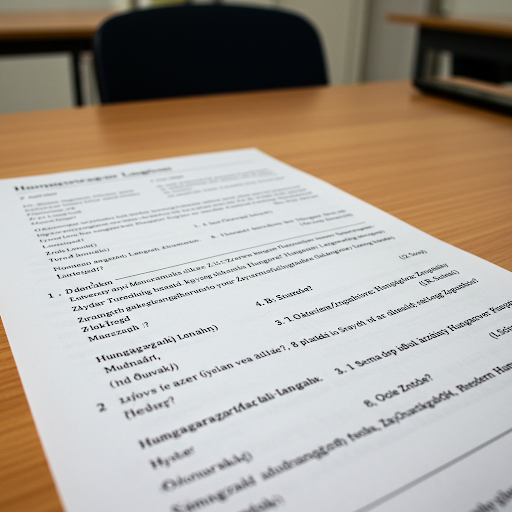
Hungarian Language Proficiency Tests Review: ECL, Origo, TELC, BME
Share
What to Expect from a Hungarian Language Proficiency Test
Embarking on the journey to master the Hungarian language is a commendable endeavor. Whether you're aiming for academic pursuits, career advancement, or personal enrichment, understanding the various Hungarian language proficiency tests available is crucial. This comprehensive guide delves into the different types of Hungarian language exams, their structures, and offers insights from individuals who have undertaken these assessments.
Understanding Language Proficiency Examinations
Language proficiency examinations are standardized tests designed to assess an individual's ability to use a language effectively in various contexts. These exams evaluate skills such as listening, reading, writing, and speaking. Achieving certification can open doors to educational opportunities, employment prospects, and cultural integration.
Types of Hungarian Language Proficiency Tests
Several Hungarian language proficiency tests cater to different needs and objectives. Below are some of the most recognized assessments:
1. ECL (European Consortium for the Certificate of Attainment in Modern Languages)
The ECL exam assesses language proficiency across four levels: A2, B1, B2, and C1. It evaluates candidates in listening, reading, writing, and speaking. The test is widely recognized in Europe and is suitable for those seeking academic or professional validation of their Hungarian language skills.
Structure
-
Listening Comprehension: Understanding spoken conversations, interviews, and narratives.
-
Reading Comprehension: Answering questions based on articles, reports, or everyday texts.
-
Writing: Producing short or long-form texts such as essays or formal letters.
-
Speaking: Conversational tasks, including describing images, expressing opinions, and role-plays.
Difficulty
-
A2 and B1 levels are moderate, testing everyday language skills.
-
B2 and C1 levels are challenging, requiring fluency in abstract discussions and formal communication.
Recognition
-
Recognized across Europe, especially in academic and employment settings.
-
Less well-known outside Europe, making it less useful for global job markets.
Ideal For
-
Students or professionals looking for European-recognized certification.
-
Those applying for jobs or universities that require proof of Hungarian proficiency.
Pros & Cons
Well-structured, standardized format.
Recognized in European institutions.
No separate grammar section (can be harder for non-immersive learners).
Some test-takers find the listening section difficult due to rapid speech.
2. Origó Language Examination
Administered by the Language Examination Centre of Eötvös Loránd University, the Origó exam offers assessments at multiple levels. It focuses on practical language use and is divided into written and oral components. This exam is ideal for individuals aiming to study or work in Hungary.
Structure
-
Written Test: Reading comprehension, grammar tasks, and written assignments.
-
Oral Test: Conversational assessment based on daily life scenarios and topic-based discussions.
Difficulty
-
B1 and B2 levels are accessible for those familiar with Hungarian structure.
-
C1 level is demanding, focusing on academic and professional fluency.
Recognition
-
Highly recognized in Hungary, especially for university admissions and government jobs.
-
Less recognition outside Hungary compared to TELC or ECL.
Ideal For
-
People living in Hungary who need language certification for education or work.
-
Those applying for Hungarian citizenship.
Pros & Cons
One of the most trusted tests in Hungary.
Includes a separate grammar section, helpful for non-native learners.
Limited international recognition.
More traditional in format, lacking modern language testing approaches.
3. TELC (The European Language Certificates)
TELC offers Hungarian language exams aligned with the Common European Framework of Reference for Languages (CEFR). The tests are available at various levels and assess communicative competencies. TELC certificates are recognized internationally, making them valuable for global opportunities.
Structure
-
Listening Comprehension: Short and long spoken passages with multiple-choice questions.
-
Reading Comprehension: Text-based questions on news, reports, and essays.
-
Writing: Formal and informal writing tasks.
-
Speaking: Paired conversations, role-plays, and topic-based discussions.
Difficulty
-
Generally fair but requires a balanced skill set in all four language areas.
-
Higher levels demand strong argumentation skills in writing and speaking.
Recognition
-
Highly valued across Europe, particularly in Germany and Austria.
-
Recognized for work and academic applications worldwide.
Ideal For
-
People needing a globally recognized Hungarian language certificate.
-
Job seekers in multinational companies.
-
Those applying for higher education in Europe.
Pros & Cons
Internationally recognized, making it a great certification for work/study.
Balanced structure testing all skills.
Can be more expensive than other Hungarian proficiency tests.
Speaking exam can be intimidating, especially the role-play section.
4. BME Language Examination
Offered by the Budapest University of Technology and Economics, the BME exam evaluates candidates' language skills in professional and academic contexts. It is suitable for those seeking to demonstrate proficiency for educational or occupational purposes within Hungary.
Structure
-
Written Exam: Grammar, reading, and writing tasks tailored to workplace or academic environments.
-
Oral Exam: Dialogue-based assessment with real-life scenarios.
Difficulty
-
The B1 level is manageable, focusing on daily communication.
-
B2 and C1 levels are technical and complex, requiring proficiency in formal speaking and writing.
Recognition
-
Primarily recognized in Hungary for university admissions and professional certification.
-
Limited use internationally, compared to TELC or ECL.
Ideal For
-
Those aiming for higher education in Hungary.
-
Professionals needing industry-specific Hungarian proficiency.
Pros & Cons
Best choice for academic and technical language learners.
Includes specific professional Hungarian usage.
Not widely accepted outside Hungary.
More technical than conversational.
Structure and Content of Hungarian Language Exams
While each exam has its unique format, most Hungarian language proficiency tests share common components:
- Listening Comprehension: Assessing the ability to understand spoken Hungarian through dialogues, interviews, or monologues.
- Reading Comprehension: Evaluating understanding of written texts, including articles, essays, and reports.
- Writing: Testing the ability to produce coherent written texts, such as essays, letters, or summaries.
- Speaking: Measuring oral proficiency through tasks like presentations, discussions, or role-plays.
Each section is designed to assess practical language use, ensuring that candidates can effectively communicate in real-life situations.
Experiences from Test-Takers
Insights from individuals who have taken Hungarian language proficiency tests can provide valuable perspectives:
"Preparing for the ECL exam was challenging but rewarding. The practice materials were instrumental in improving my listening and reading skills. On exam day, I felt confident and well-prepared." – Maria S.
"The Origo exam's focus on practical language use made it relevant to my daily interactions in Hungary. The speaking component, though nerve-wracking, boosted my conversational skills significantly." – Ahmed K.
"Taking the TELC exam opened doors for me internationally. The certification is recognized by employers across Europe, which enhanced my job prospects." – Li Wei
Preparing for a Hungarian Language Proficiency Test
Effective preparation is key to success in any language proficiency examination. Here are some strategies to consider:
- Understand the Exam Format: Familiarize yourself with the structure, sections, and types of questions in the chosen exam.
- Utilize Official Study Materials: Access practice tests and study guides provided by the exam administrators to align your preparation with the test's requirements.
- Engage in Regular Practice: Consistent practice in listening, reading, writing, and speaking will enhance your overall proficiency.
- Seek Feedback: Work with language instructors or join study groups to receive constructive feedback on your performance.
- Simulate Exam Conditions: Practice under timed conditions to build confidence and improve.
Contact us for more information on how we can help you learn Hungarian!
